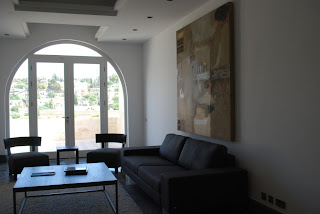 This is the third time I travel to Egypt, but somehow I think I'm seeing it through a slightly different lens. Perhaps it's my rigorous international development training, or the various hosts I've had on this trip, or the couple of meetings I had...
This is the third time I travel to Egypt, but somehow I think I'm seeing it through a slightly different lens. Perhaps it's my rigorous international development training, or the various hosts I've had on this trip, or the couple of meetings I had...Leaving the airport, heading west towards Cairo, the length and depth of British rule over Egypt is immediately apparent. Ornate French and British architecture mixes with beautiful grand mosques along the entire 10km stretch of road from the airport to Cairo. It's quite impressive. Downtown I was met with a similar, but more aged, extravagance. Everything in Cairo looks old. Even that which is grand and high end has a worn look, as if the dust and pollution makes things nearly impossible to keep up.
 Architecture in "New Egypt" between Cairo and the Airport
Architecture in "New Egypt" between Cairo and the AirportI had an interesting meeting with the managing director of the Endeavor office in Cairo, Ahmed Ezzat. Ahmed is a 25-year finance veteran, a venture investor and a documentary filmmaker. e described Egypt's economy as a "hand-to-mouth" needs based economy rather than a knowledge-based economy. "You have an elistist system," he said, "and the middle class has evaporated." He said of the 250 billion Egyptian pounds (~$45 billion) in the Country's annual budget, 60 billion goes to subsidies (mostly bread, as Egyptians consume 560 grams of bread per capita per day), 70 billion pays public sector salaries, 60 billion is spent servicing debt, leaving 60 billion for all other government programs, including health, education and business promotion.
 View of trendy Zamalek and the Nile from friend's apartment
View of trendy Zamalek and the Nile from friend's apartment
 Exclusive Beymen Department Store at the Four Seasons Garden City
Exclusive Beymen Department Store at the Four Seasons Garden CityIndeed the "elitist" culture, lack of a middle class, and the "hand-to-mouth" nature of the economy is evident from a stroll down the street and a nice dinner out. But Egypt isn't that poor. PPP-adjusted annual GDP is ~$5,500 (4x that in 1981). The country engaged in a series of economic reforms in the 1990s including liberalization of trade and investments, reduction of price controls, reduction of taxes, and reduction of subsidies. But the country still has a long way to go. From Ahmed's perspective, regulation is not the problem. Rather enforcement of regulation is. Thus it's the softer things the country must focus on - corruption, governance, and bloated bureaucracies. This will help pave the way for a knowledge-based economy.
Currently, Endeavor-Egypt is supporting three entrepreneurs: First is jewelry designer Azza Fahmy who has recently gained fame across the Arab world and among Arabs in the West. Her daughter is taking over the business, putting growth into high gear. Second is wireless communications technology provider Khaled Ismail of SySDSoft. And third are Hind and Nadia Wassef of Diwan Bookstores. But Ahmed says Endeavor-Egypt has a long way to go if it plans to make a dent in the Egyptian economy. The office hopes to add 10-12 new high impact entrepreneurs per year such that it's supporting 50-60 by its 5th anniversary.


I also visited with the Economic Research Forum in Cairo. I met with Dr. Ahmed Galal, their director as well as Dr. Nadia Belhaj Hassine, one of their senior economists. This is an economic research powerhouse, focused on development issues in the Middle East and North Africa. Check out their work here: www.erf.org.eg





















